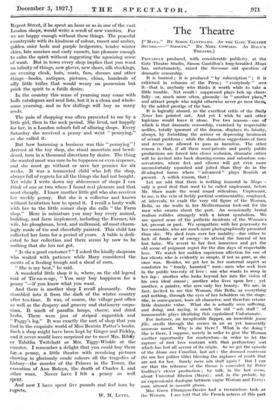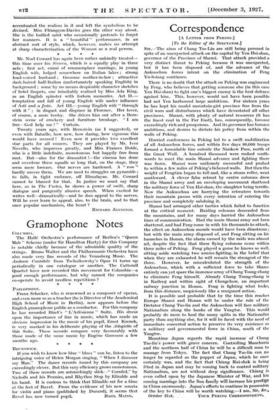The Theatre
hiATA:' BY SIMON GANTILLON. AT THE GATE THEATRIZ STUDIO.-" SIROCCO:' BY NOEL COWARD. AT DALY'S
THEATRE.]
PRIVATELY produced, with considerable publicity, at the Gate Theatre Studio, Simon Gantillon's long-heralded Maya has, unfortunately, raised the tiresome old question of dramatic censorship.
It is banned ; it is produced " by subscription " ; it is criticized in columns of the Press ; " everybody " secs
it—that is, anybody who thinks it worth while to take a little trouble. Net result : suppressed plays bob up cheer- fully—or, much more often, gloomily—in " anothet place," and attract people who might otherwise never go near them, by the added prestige of the ban.
It is logically absurd, as the excellent critic of the Daily News has pointed out. And yet I wish he and other
logicians would leave it alone. For two reasons—one of which is that dramatic censorship, exercised by respectable aediles, totally ignorant of the drama, displays its fatuity,
always, by forbidding the serious or depressing treatment
of sexual problems ; while the shameless suggestions of farce and revue are allowed to pass as harmless. The other reason is that, if all these semi-private and partly public pioductions are forced into closer seclusion, dramatic critics will be invited into back drawing-rooms and suburban con- servatories, where feet and elbows will get even more uncomfortably squashed and jolted than they do in the ill-adapted barns where " advanced " plays flourish at present. A selfish reason, that !
Let me add that there is nothing immoral in Maya— only a good deal that used to be called unpleasant, before
Mr. Shaw made the word sound ridiculous. Unpleasant,
to me, is the vein of feebly poetical sentimentality, employed, at iatervals,' to exalt-'the 'very old figure of the Woman,
Bella, as she waits in her Mediterranean look-out for the
melt who swarm about the port. An occasionally brutal realism collides strangely with a latent symbolism. We
are spared none of the pathetic incidents of the Woman's lot, present or past. We sympathize with her generosity to her comrades, who are much more photographically presented than she. We shed tears over her inability—due either to lack of funds or of energy—to attend the funeral of her lost babe. We revert to her first innocence and get the old scene of poignant regret for the dim days of respectable love. We watch her sudden capricious affection for one of her clients who is evidently as simple, if not as pure, as she once was. Besides, we get her in her maternal aspect as comforter to " lonely, haunted " men—men who seek love in the public travesty of love : one who wants to weep in her lap ; another who looks beyond her into the vision of
his own ideal amour ; another who lives upon her ; yet another, a painter, who sees only her beauty. We are, in fact, invited to see this Woman, this Bella, as everything and nothing, through the eyes of her beholders on the stage. She, in consequence, loses all character, and therefore retains little dramatic value. What she is actually seen suffering, and doing, and saying, is much the old " sob stuff " of innumerable plays idealizing this capitalized Unfortunate. For instance, an inexplicable flapper, an incredible jeune fille, strolls, through the scenes in an as yet innocently amorous mood. Why is she there ? What is she doing ?
She is there, I suppose. merely in order to give the Woman another opportunity for martyrdom—in order to let the
rapture of first love contrast with that perfunctory sort which has lost all savour of its origin. So we get the episode of the Dame aux Camelia.% last act : the doomed courtesan (to use her politer title) blessing the raptures of youth that are not for her. Surely mere sob stuff again ? But I can see that the triteness of the theme is concealed by Peter Godfrey's clever production ; by talk, in the last scene, about Universal Illusion (Maya) ; and, in the prelude, by ad' expressionist duologue between vague Woinan and Every- man, uttered in moonlit gloom.
Miss Gwen Ffrangeon-Davies had a tremendous task as the Woman. I am told that the French actress of this part accentuated the realism in it and left the symbolism to be divined. Miss Ffrangcon-Davies goes the other way about. She is the bullied saint who occasionally pretends to forget her manners. It is a " beautiful " performance, in an abstract sort of style, which, however, makes no attempt at sharp characterization of the Woman as a real person.











































































 Previous page
Previous page